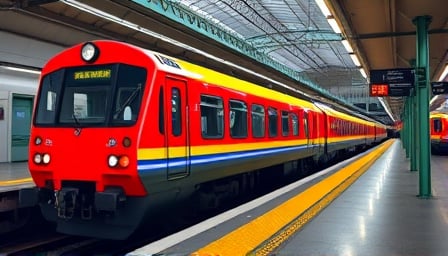Knorr-Bremse AG Faces Economic Headwinds Amid Strong Euro
In a decisive move that underscores the volatility of the global economy, Knorr-Bremse AG, the Munich-based leader in braking systems for rail and commercial vehicles, has revised its financial outlook for the year. The company, listed on the Xetra stock exchange, announced a reduction in its revenue expectations, attributing this adjustment primarily to the adverse effects of a robust Euro. This development, reported by multiple financial news outlets on July 31, 2025, has sent ripples through the market, though the reaction has been notably measured.
The Impact of a Strong Euro
The Euro’s strength has emerged as a formidable challenge for Knorr-Bremse, a company with a global footprint. The currency’s appreciation has eroded the competitiveness of European exports, a factor that has not spared Knorr-Bremse despite its diversified product range, which includes braking systems, entrance systems, and driver assistance technologies. The company’s decision to lower its revenue forecast is a direct acknowledgment of these currency-induced pressures.
Financial Performance Amidst Challenges
Despite the downward revision in revenue expectations, Knorr-Bremse has demonstrated resilience in other areas of its financial performance. The company reported an increase in its operating EBIT to €498 million in the first half of 2025, with a margin improvement to 12.6%. This achievement is particularly noteworthy given the persistent geopolitical and economic headwinds that have characterized the period. Furthermore, the rail segment of Knorr-Bremse has shown robust performance, contributing positively to the company’s overall profitability and margin expansion.
Market Reaction and Future Outlook
The market’s response to Knorr-Bremse’s announcement has been surprisingly calm, suggesting a level of anticipation or acceptance of the challenges posed by the strong Euro. Investors and analysts alike are closely monitoring the company’s strategic moves to mitigate the impact of currency fluctuations and to capitalize on its strengths, particularly in the rail sector.
As Knorr-Bremse navigates these turbulent waters, the company’s ability to adapt to external pressures while leveraging its core competencies will be critical. The rail segment’s strong performance offers a beacon of hope, indicating potential areas for growth and profitability even in the face of broader economic challenges.
Conclusion
Knorr-Bremse AG’s recent financial adjustments reflect the complex interplay of global economic forces and the specific challenges faced by multinational corporations. While the strong Euro has necessitated a recalibration of revenue expectations, the company’s underlying financial health and strategic focus on high-performing segments like rail suggest a path forward through careful management and strategic innovation. As the global economic landscape continues to evolve, Knorr-Bremse’s journey will be one to watch for investors and industry observers alike.
